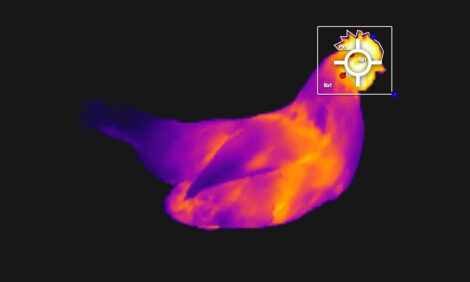



New Vaccine to Protect Against Two Important Poultry Diseases
North Carolina State University scientists have achieved a biological characterisation of a serotype 1 Marek's disease virus-vectored bi-valent vaccine for infectious laryngotracheitis and Marek's disease.Laryngotracheitis (LT) is a highly contagious respiratory disease of chickens that produces significant economic losses to the poultry industry, according to Isabel M. Gimeno and James S. Guy of North Carolina State University.
The frequency of LT has increased in recent years, they report. Administration of modified live vaccines (ML-LT-vaccines) protects against the development of the disease but has been related to perpetuation of outbreaks due to virus shedding, spread to unvaccinated birds and reversion to virulence.
Recombinant DNA-derived vaccines (r-LT-vaccines), using turkey herpesvirus (HVT) and fowlpox virus (FPV) as vectors, have been produced and are commercially available. Recombinant vaccines are safe as they do not revert in virulence or induce clinical disease. However, HVT-based vaccines confer limited protection against challenge with highly virulent Marek's disease virus (MDV)
Deletion of oncogene meq from the oncogenic very virulent MDV strain Md5 resulted in a very efficient vaccine against Marek's disease (rMd5Δ MEQ). This recombinant strain has been proven to be more efficient that gold standard vaccine CVI988 and much more protective than HVT. Strain rMd5ΔMEQ replicates in the chicken as much as wild type MDV strains but it does not induce tumors. rMd5ΔMEQ replicates in the lung as well as in other tissues and prompts an early and strong immune response that is long lasting. Because its ideal features as vector, recently LTV genes gB and gJ were inserted into the genome of rMd5Δ MEQ. It is expected that either of the two rMd5ΔMEQ-LT vaccines (rMd5ΔMEQ-gB, rMd5ΔMEQ-gJ) or a combination of both (rMd5ΔMEQ-gB + rMd5ΔMEQ-gJ) will confer very high protection against MD and against LT, and it could be the solution for a proper control of both LT and MD in the field.
The authors' central hypothesis for this study, sponsored by the US Poultry & Egg Association, is that serotype 1 MDV-vectored bivalent vaccine for LT and MD will be highly efficacious against both diseases.
The specific objectives of this work were:
- To evaluate protection conferred by BACΔMEQ-LT vaccines against LT and to compare it with protection conferred by ML-LT-vaccines and rHVT-LT in broiler chickens
- To evaluate protection conferred by BACΔMEQ-LT vaccines against MD and to compare it with protection conferred by CVI988 and rHVT-LT in broiler chickens
Gimeno and Guy report their results demonstrated that the three serotype 1 MD bivalent vaccines (BAQΔMEQ-gB, BAQΔMEQ-gB + BAQΔMEQ-gJ, and BAQΔMEQ-gJ) replicated in chickens and were safe to use in commercial meat type chickens bearing maternal antibodies against MDV. BAQΔMEQ-gB by itself protected as well as rHVT against challenge with LTV and better than CEO.
Addition of BAQΔMEQ-gJ by itself did not increase the level of protection conferred by BACΔMEQ-gB. Moreover, BAQΔMEQ-gJ did not seem to protect adequately against LT challenge.
The three serotype 1 MD bivalent vaccines (BAQΔMEQ-gB, BAQΔMEQ-gB + BAQΔMEQ-gJ, and BAQΔMEQ-gJ) were able to induce high levels of protection against MD against an early challenge with vv+MDV strain 648A. Protection conferred by the three serotype 1 MD bivalent vaccines was much higher than that conferred by rHVT or by CVI988.
The use of recombinant vaccines using HVT vector has increased worldwide within the last decade.
There are two major limitations on the use of recombinants HVT (rHVT), according to Gimeno and Guy. Firstly, they say, it is not possible to administer more than one rHVT to avoid undesirable virus interactions. Moreover, HVT by itself cannot protect properly against MD.
These results open a new avenue in the development of recombinant vaccines using serotype 1 MDV as a vector, according to the Raleigh-based scientists. BAQΔMEQ-based recombinants could be used in combination with r-HVT without interfering in virus replication. In addition, BAQΔMEQ-based recombinants are much more efficient than r-HVT against MD and could control efficiently the emergent highly pathogenic MDV strains.
Further Reading
Find out more information on Marek's disease (MD) by clicking here and on infectious laryngotracheitis (ILT) by clicking here.
January 2014








